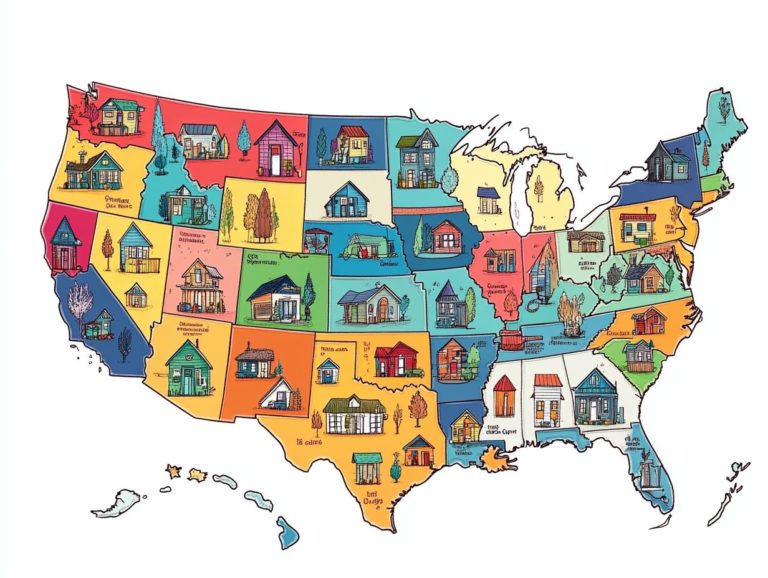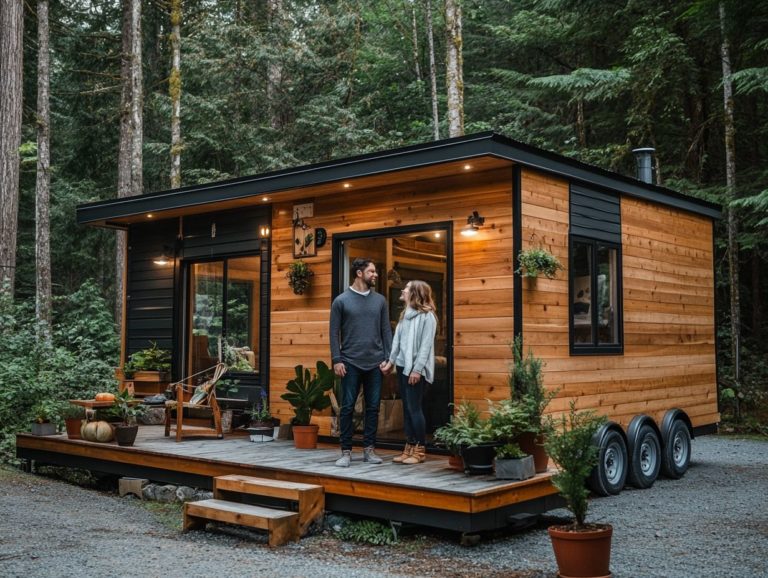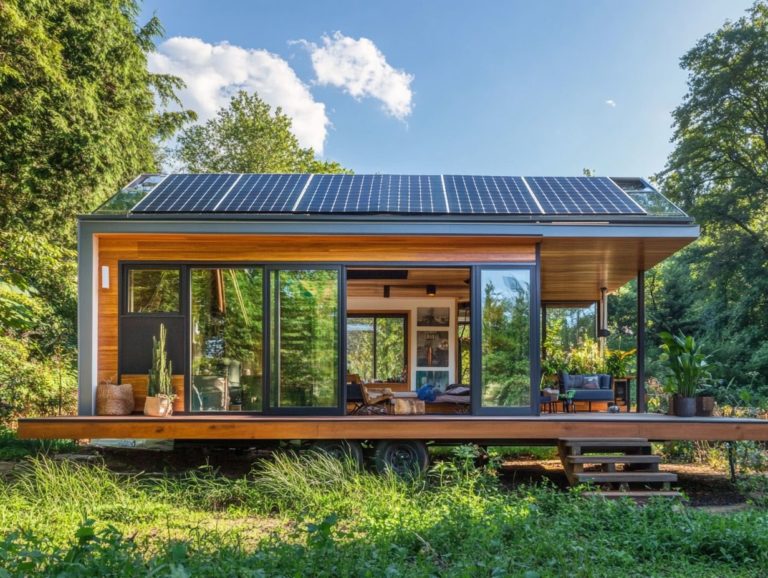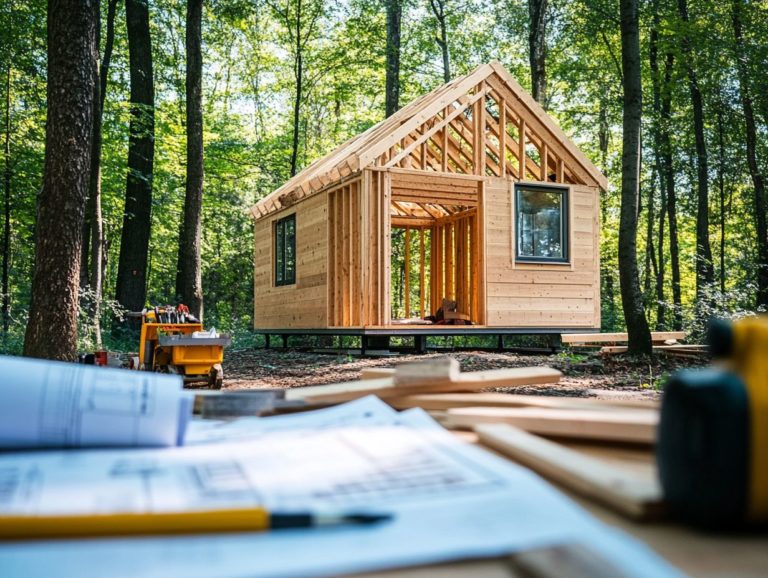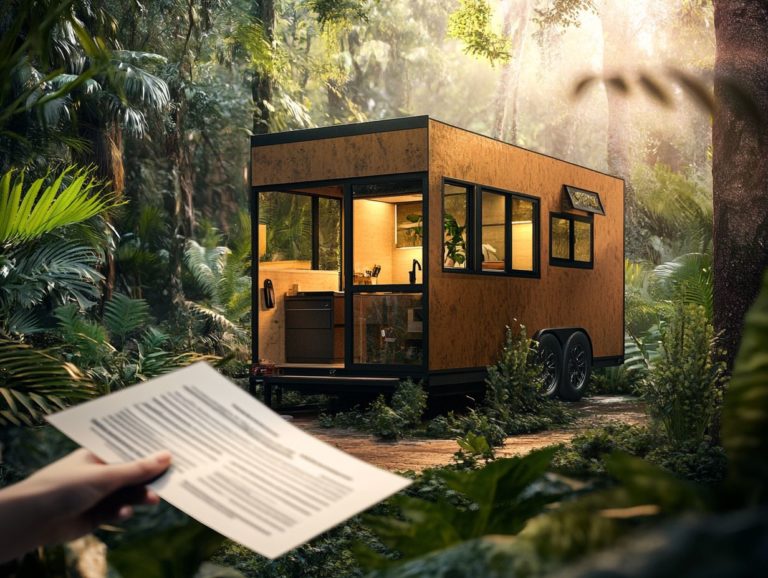Tiny House Associations and Legal Support
Tiny house living is not just a trend. It embodies a lifestyle focused on simplicity, sustainability, and community.
Navigating the intricacies of tiny house regulations and best practices can feel daunting. Tiny House Associations are invaluable allies in this journey.
In this article, you ll discover the myriad benefits of joining these associations, including networking opportunities, essential resources, and legal support for understanding zoning laws.
Whether you re a seasoned tiny dweller or just starting your journey, you’ll find guidance on selecting the perfect association that meets your needs.
Get ready to dive into the tiny house movement and discover a lifestyle full of possibilities!
Contents [hide]
- Key Takeaways:
- Benefits of Joining a Tiny House Association
- Legal Support for Tiny House Living
- How to Find and Join a Tiny House Association
- Frequently Asked Questions
- 1. What are tiny house associations and what do they do?
- 2. Are there any legal considerations when building or living in a tiny house?
- 3. Can tiny house associations provide assistance with legal challenges related to living in a tiny house?
- 4. Are there different types of tiny house associations?
- 5. Can tiny house associations help me find a place to park my tiny house?
- 6. How can I join a tiny house association?
Key Takeaways:
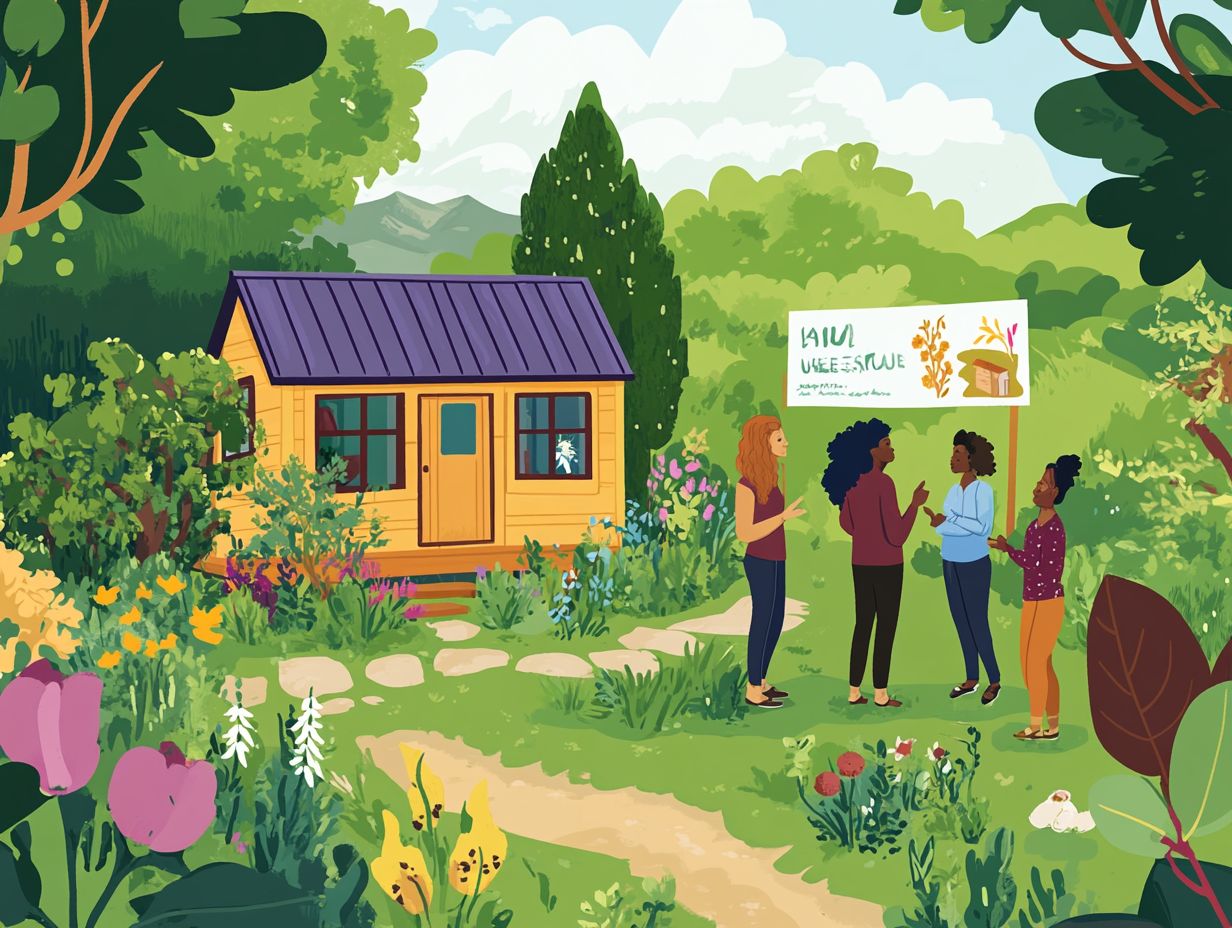
- Joining a tiny house association connects you with others who share your interests.
- These associations help you understand your rights regarding zoning and building codes.
- Research different associations to find one that suits your needs.
What are Tiny House Associations?
Tiny House Associations serve as essential networks for those interested in tiny homes. They champion the tiny house movement while advocating for affordable housing solutions.
Organizations such as Operation Tiny Home and the American Tiny House Association empower you to share resources, expertise, and support within the tiny home industry.
By participating in community housing initiatives, these associations address critical issues such as housing instability and the urgent need for legal tiny homes, particularly for natural disaster survivors.
They cultivate a sense of belonging among tiny home communities, often hosting workshops and events that encourage collaboration and innovation.
Beyond providing shelter, they focus on healing from trauma and offering emergency housing solutions to support individuals and families in need.
By connecting you with like-minded individuals, Tiny House Associations not only elevate the visibility of tiny living but also contribute to discussions about housing equity and resilience. For those interested in legal aspects, exploring resources like tiny house residency: legal insights can be particularly helpful, especially for young adults emerging from foster care.
Benefits of Joining a Tiny House Association
Joining a Tiny House Association presents numerous advantages that empower you to make informed choices about tiny homes while contributing to the broader mission of advocating for affordable housing solutions.
As a member, you unlock a wealth of resources, from valuable networking opportunities to impactful advocacy initiatives and insights into the latest trends in the tiny home industry, including innovations in offsite construction.
In a community dedicated to tiny housing solutions, you have opportunities to collaborate on projects addressing housing instability, providing essential support for transitional housing initiatives aimed at diverse demographics, including natural disaster survivors and young adults emerging from foster care, thereby aiding in the overall healing from trauma process.
Networking Opportunities
Tiny House Associations offer you exceptional networking opportunities that connect you with fellow enthusiasts and industry professionals passionate about the tiny house movement. Whether you attend local meetups, engage in online forums, or participate in major events like the offsite construction expo, you ll find amazing chances to share experiences and collaborate on projects.
These networks allow you to discuss best practices for creating legal tiny homes and learn from experts on navigating the complexities of the tiny home industry, including insights into ICC/THIA Standard (International Code Council/Tiny Home Industry Association) compliance, as well as understanding tiny house communities’ legal rights and duties.
By immersing yourself in these events, you ll uncover a treasure trove of resources, from sustainable building techniques to financing options specifically designed for tiny dwellings. Workshops and panel discussions often feature pioneers in the tiny house sector, providing invaluable insights that can ignite new community initiatives.
You’ll discover opportunities for collaborative projects, whether it s shared living spaces or advocacy efforts for zoning changes. All of these cultivate a sense of belonging and camaraderie among enthusiasts. Joining this vibrant community expands your network and empowers you to contribute meaningfully to the expanding tiny house movement.
Resources and Information for Members
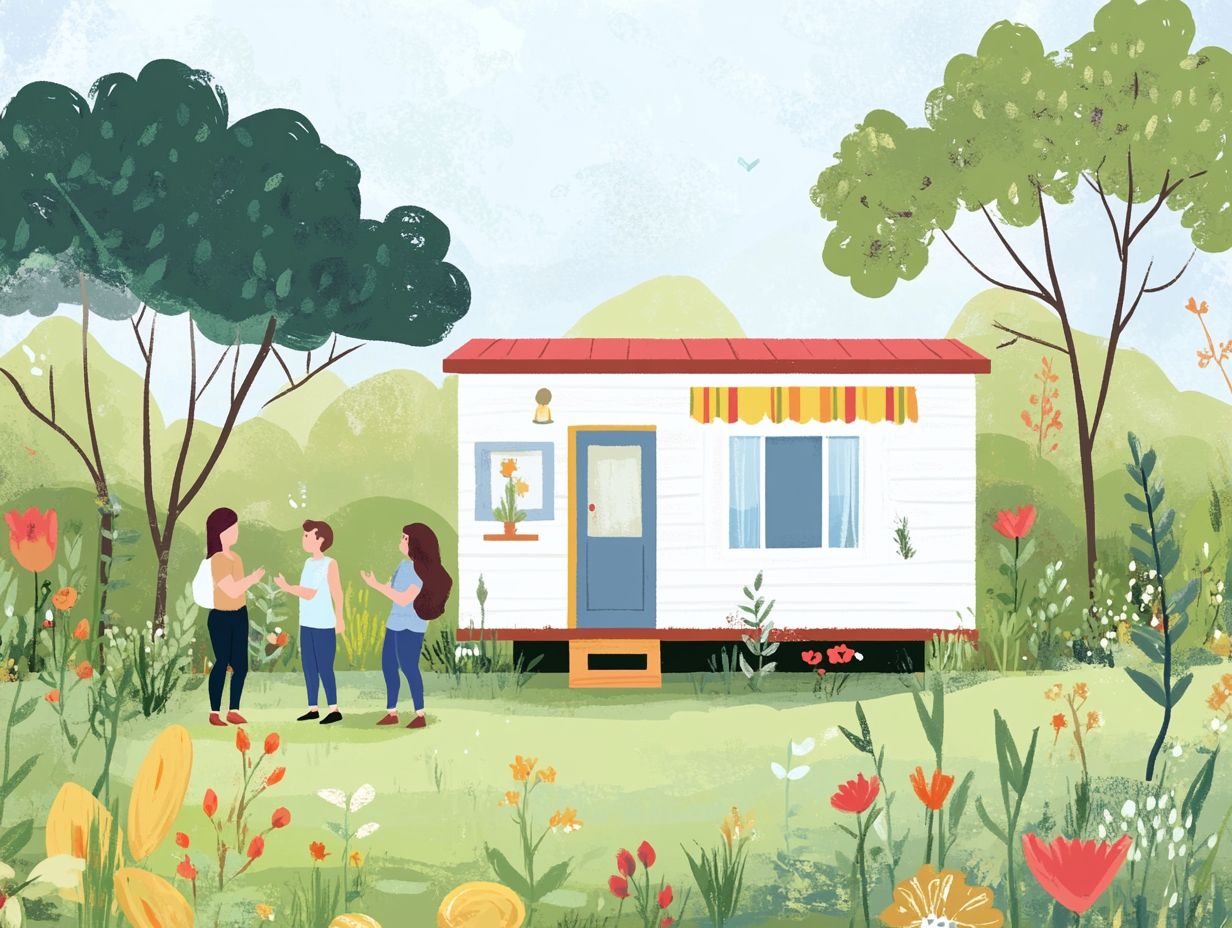
Being part of a Tiny House Association offers you a wealth of comprehensive resources and insights that are truly invaluable. As a member, you gain access to best practices for constructing high-quality tiny homes, along with essential knowledge about legal tiny homes, zoning regulations, and many tiny housing options available.
This treasure trove of information empowers you to make well-informed decisions that align with your housing needs and aspirations, contributing to the broader mission of enhancing affordable housing options.
Beyond these crucial building guidelines, you can also explore a diverse array of educational materials that delve into sustainable living practices and effective community organization strategies. Legal advice, specifically tailored to the unique challenges faced by tiny homeowners, especially those grappling with housing instability, is readily at your fingertips. For instance, understanding tiny house homeowner associations can provide valuable insights.
The association provides comprehensive guides that clarify your rights and responsibilities within your local housing context.
Collectively, these resources not only elevate your individual well-being but also cultivate a strong sense of community and support among members who are all striving for greater housing stability.
Legal Support for Tiny House Living
Legal support for tiny house living is essential for anyone aiming to navigate the intricate web of zoning laws and building codes that govern tiny homes. Tiny House Associations provide valuable resources and advocacy, guiding you through local regulations and ensuring compliance with the standards set by organizations like THIA and the ICC/THIA Standard.
This legal backing is crucial for those wishing to establish legally recognized tiny homes within communities, tackling issues of housing instability and paving the way for sustainable living solutions.
Understanding Zoning and Building Codes
Understanding zoning and building codes is essential for anyone considering the installation of a legal tiny home, as regulations can vary significantly by region.
For example, many municipalities impose strict requirements regarding minimum square footage, setbacks from property lines (the distance a building must be from property lines), and even the types of foundations permitted. These regulations can present notable challenges for those looking to downsize.
Community initiatives often collaborate with legal support networks to provide guidance in navigating these complex regulations. For those interested in tiny homes, seeking tiny house legal advice can be a great starting point. Programs advocating for the acceptance of tiny homes are emerging, encouraging policymakers to ease restrictions that impact affordable housing.
By tapping into these invaluable resources, you not only gain clarity but also bolster your chances of securing permits and discovering suitable locations for your tiny dwelling. This proactive approach contributes to the growing movement toward innovative and sustainable living solutions.
Join a Tiny House Association today and start your journey toward sustainable living!
Advocacy and Legal Representation
Advocacy, or supporting a cause or policy, and legal representation are crucial for you and your community as you navigate the journey of tiny house living. This is especially true when faced with rules and regulations. Tiny House Associations work hand in hand with legal experts and local government bodies to champion policies that benefit the tiny home movement and foster innovative community housing solutions.
By offering legal representation and engaging in advocacy work, these associations help safeguard and promote your rights and interests as a tiny home resident. This enhances their role in addressing the housing crisis and navigating the tiny house movement and legal challenges.
Through a variety of initiatives, these organizations address zoning laws and building codes while also educating the public and policymakers about the advantages of tiny living, especially its role in providing affordable housing solutions amid ongoing housing crises. For more information, check out tiny house legal resources you should know. These associations work hard to establish a robust support network that enhances emergency housing options for those in need.
In this context, legal support becomes essential, guiding you through the maze of complex regulations and ensuring your access to safe and sustainable living environments.
How to Find and Join a Tiny House Association
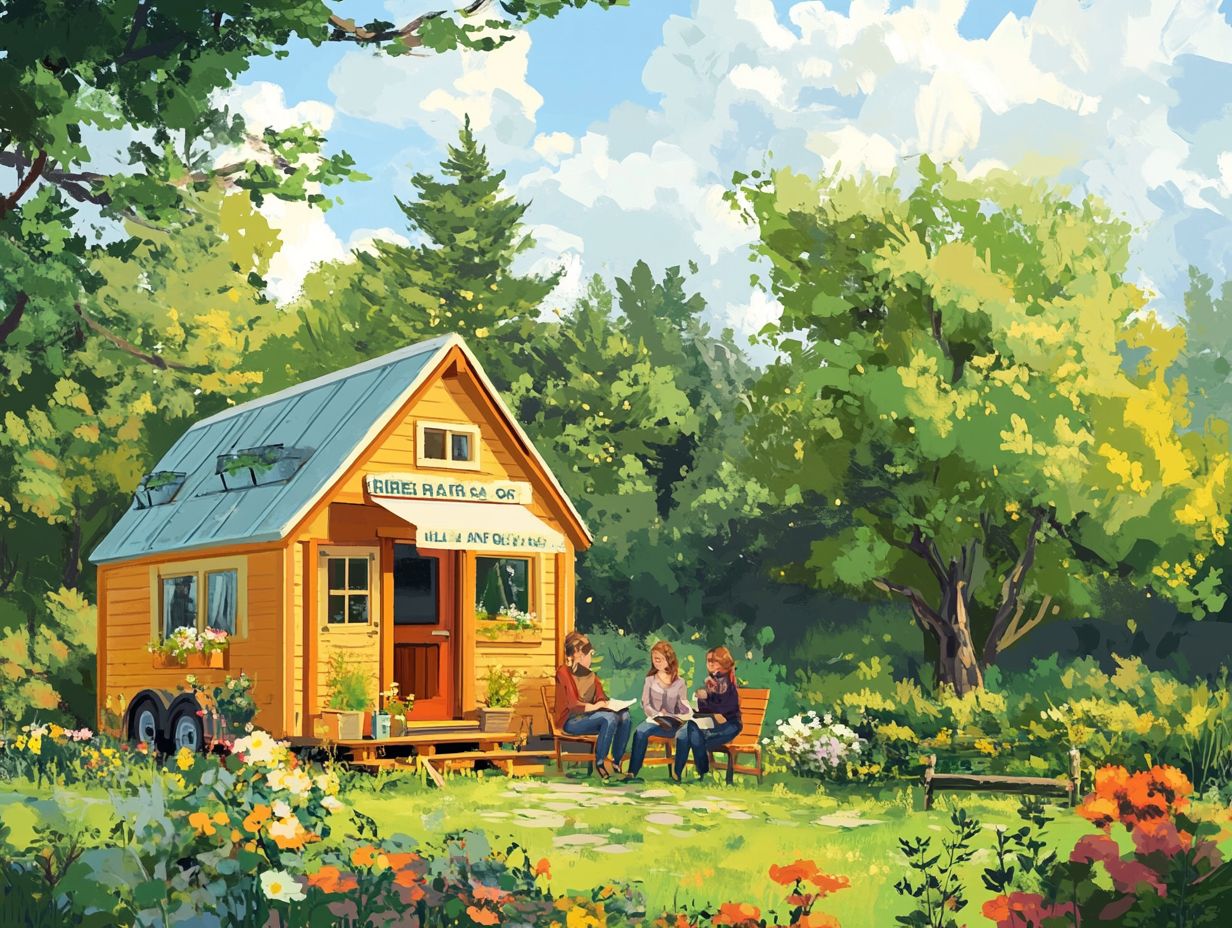
Joining a Tiny House Association can greatly enrich your knowledge of tiny homes while connecting you with a dynamic community passionate about affordable housing and innovative living solutions.
Numerous organizations, such as the American Tiny House Association and THIA, each offer unique and exciting benefits. By taking the time to research and assess these associations, you can determine which one aligns most closely with your values and housing aspirations. This way, you can play a meaningful role in the tiny house movement and the advancement of transitional housing options. If you need guidance, tiny house legal assistance is available to help navigate the complexities of tiny house living.
Researching and Evaluating Associations
Researching and evaluating Tiny House Associations is crucial for anyone looking to join a community that prioritizes tiny homes and affordable housing solutions. Consider key factors like the association’s mission, the resources they offer, the benefits of membership, and how actively they engage in community housing initiatives.
You can also use online resources such as official websites, forums, and blogs dedicated to tiny living to broaden your understanding of the various associations out there. Social media platforms are also incredibly valuable for connecting with fellow enthusiasts, sharing experiences, and keeping up with real-time updates or events.
Pay close attention to member testimonials, as they provide essential insights into how these associations impact local affordable housing initiatives and support their communities. By employing these varied research methods, you can make informed decisions about aligning yourself with an organization that truly resonates with your values and goals in the tiny house movement, including understanding the legal aspects of tiny house living and land use.
Membership Requirements and Benefits
Each Tiny House Association offers unique and exciting benefits! Membership requirements and benefits vary across organizations like THIA and the American Tiny House Association, but you can expect to gain a wealth of advantages.
As a new member, you can look forward to participating in workshops and seminars that enhance your understanding of sustainable living practices and the legalities surrounding tiny home ownership. These associations often act as a bridge to local governments eager to support affordable housing initiatives, which is crucial when navigating zoning laws or regulations, including tiny house living and legal liability.
You’ll have access to exclusive online forums where you can share experiences and insights, collaborate on projects, and feel empowered as part of a movement dedicated to making housing more accessible. Engaging with these associations not only fosters your personal growth but also amplifies the collective impact on the tiny home community, advocating for policies that benefit those seeking affordable living alternatives.
Frequently Asked Questions
1. What are tiny house associations and what do they do?
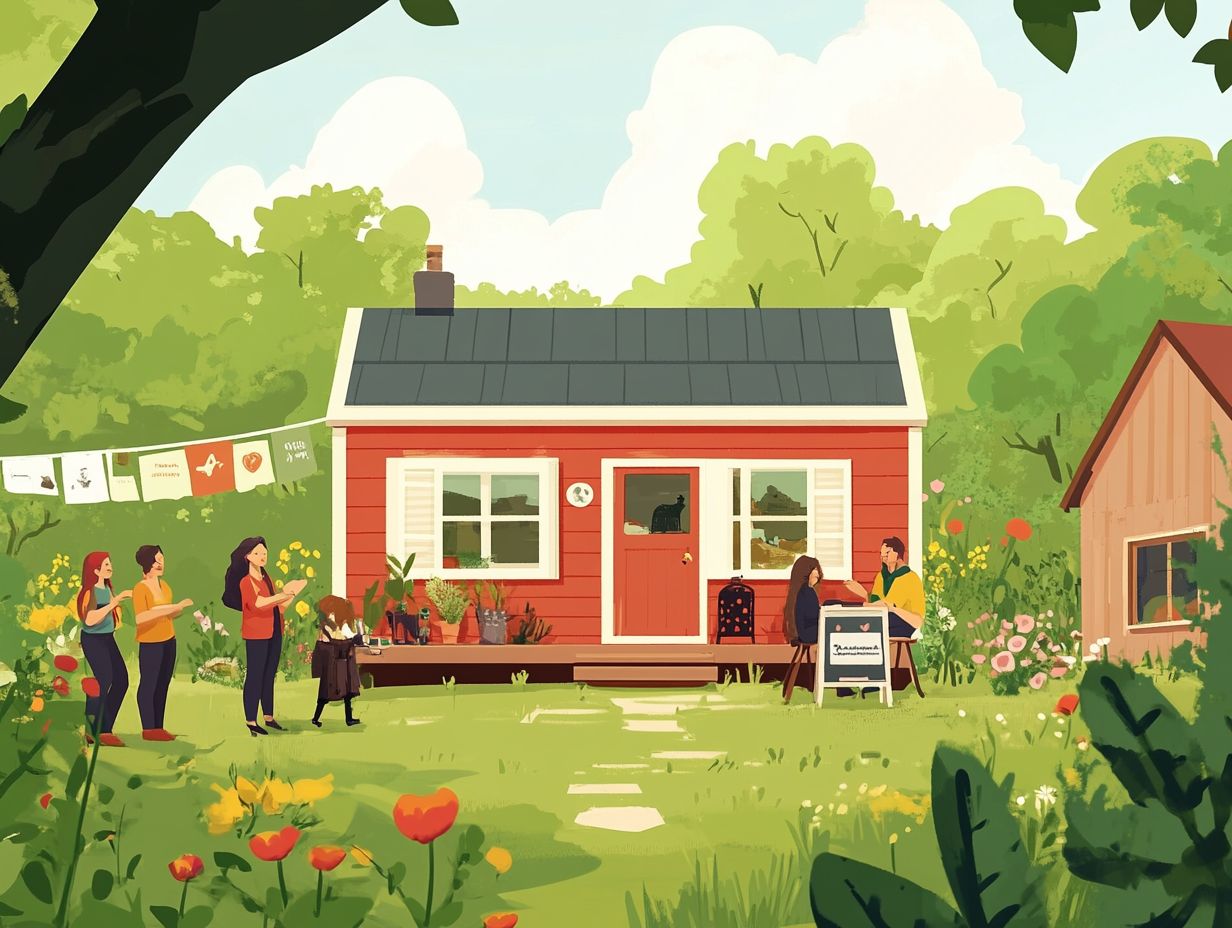
Tiny house associations support individuals interested in tiny living. They provide education, networking opportunities, and advocate for the community.
2. Are there any legal considerations when building or living in a tiny house?
Yes, there are several legal considerations when building or living in a tiny house. These include zoning laws, which determine where you can place a tiny house, building codes, and permits.
3. Can tiny house associations provide assistance with legal challenges related to living in a tiny house?
Yes, many tiny house associations offer legal support and resources for individuals facing legal challenges. They may have a network of lawyers specializing in tiny house law or provide guidance on navigating legal issues.
4. Are there different types of tiny house associations?
Yes, there are a variety of tiny house associations, each with its own focus and mission. Some may be specific to a region or state, while others cater to a particular type of tiny house, such as those on wheels.
5. Can tiny house associations help me find a place to park my tiny house?
Some tiny house associations may offer resources for finding parking for your tiny house, but this varies by association. Do your own research and reach out to potential parking options directly. Some associations have connections with local governments. They can advocate for zoning and regulations that are more friendly to tiny houses.
6. How can I join a tiny house association?
Joining a tiny house association is easy! Simply visit their website or attend an event to become a member. Some associations may charge a membership fee, while others may be free to join. Always research the association and their membership requirements before joining.

